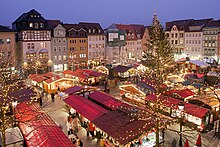Nittel Nacht
Nittel Nacht (Hebrew: ניטל נאַכט) or Nittel is a Jewish folk custom. It is observed by some Jewish communities on Christmas Eve. It was observed as early as the late 16th century by the Maharsha and was popularized in the 1700s by the Baal Shem Tov, but is not a widespread custom among modern Jews.

Quotes
edit- Although sources written by Jewish converts to Christianity should be treated with caution, the claim put forth by them that Toledot Yeshu was read in Jewish homes on Christian Festivals, including and especially Christmas Eve is worth taking seriously. In fact, Sarit Kattan Gribetz suggests that Toledot Yeshu was cast in the same literary mold as the Scroll of Esther, and like it, was publicly read on particular occasions, such as Purim and Christmas Eve. … Hence, Nittel should be regarded as ritual-theatrical expression of the narrative embodied in liturgical time.
- Shai Alleson-Gerberg: "Nittel Nacht: An Inverted Christmas with Toledot Yeshu". TheTorah.com (2016).
- By the mid-1900s, when Judeo-Christian relations matured, the Christmas Eve customs fell mostly by the wayside as the Jewish community wanted to show their support for their Christian neighbors. While there are still some Orthodox groups that observe Nittel Nacht, these are not widespread customs among modern Jews.
- Benyamin Cohen: "Holy Night: The Little-Known Jewish Holiday of Christmas Eve". Slate (2009-12-22).
- Nittel Nacht comes to us from an era when relations between Jews and Christians, the Church and Judaism, could be described as 'tense' at best. We are fortunate to be living in a day and age where relations between these two groups have flourished immensely in both the Catholic and Protestant denominations.
- Rabbi Ari Enkin: "Nittel Nacht: Christmas Eve". Hirhurim (2007-12-23).
- A common theme in the anti-Jewish writings by medieval apostates in Germany is that on Christmas Eve specifically, Jesus "has to wander in all pits of excrement or latrines throughout the world," as one such apostate Johann Pfefferkorn wrote in 1511. … [Johann] Adrian also mentions that parents tell their children "See that the hanged one does not pull you in," meaning into the toilet.
- Elon Gilad: "Why Some Jews Don't Study Torah on Christmas Eve". Haaretz (2018-12-20).
- Today, in America, Christmas is not a fearful time, and most American Jews have good relations with their Christian neighbors—and certainly lack the impetus to read the antagonistic Toledot Yeshu.
- Rabbi Joshua E. Plaut: "What Eastern European Jews Did on Christmas". My Jewish Learning (2015).
- We are told, however, that these behaviors do have a unified purpose: they are all intended to ward off a dangerous supernatural force that descends on Christmas Eve. Four centuries of informants state, hint or imply that this dangerous supernatural force is none other than a revenant Jesus of Nazareth who returns from the dead to haunt the community on that night – creeping through latrines, approaching unwary bystanders, or flying out of books.
- Rebecca Scharbach: "The Ghost in the Privy: On the Origins of Nittel Nacht and Modes of Cultural Exchange". Jewish Studies Quarterly, vol. 20, no. 4 (2013), pp. 340–373. doi:10.1628/094457013X13814862384351.
- It's a little bit—some of you might be troubled by what we're going to say. Let me just first say that what I'm looking at tonight is a Jewish folk custom. I certainly don't need to denigrate any other religion, but historically, we can understand that the religions didn't always get along as well as they do today, and Jews were subject to all sorts of persecution, and Jews responded with the pen. And I think we can appreciate this and look at what is a folk custom without—you know, seeing it as an aspect of Jewish cultural history.
- Marc Shapiro, in "Christmas Eve: Is it a Time for Torah Study?" (02:52–03:23). Torah in Motion (2020-12-27).
- The notion that Jesus is condemned to crawl through the latrines on Christmas eve is quite significant … presumably, a passage in Gittin 57a is relevant in this regard and may even be the origin of the notion that Jesus must crawl through the latrines.
- Marc Shapiro: "Torah Study on Christmas Eve". Journal of Jewish Thought and Philosophy 8.2 (1999): 319–353 [320–321]. doi:10.1163/147728599794761635.
- It used to be dangerous to go out on this night. [Observant Christians] would go to church, hear sermons about how Jews were Yoshke (Jesus) killers, and so it wasn't safe for the Jews to go outside. If that's the case, then there's no room for [Nittel Nacht] to be kept today because that isn't a worry or fear anymore.
- Rabbi Reuven Wolf, in "A Brief History of Nittel Nacht" by Kylie Ora Lobell. Jewish Journal (2016-12-21).